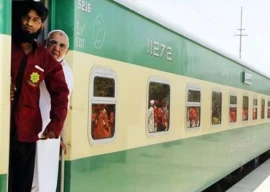
Her eyes were bright and eager. She squirmed amidst a gathering of little girls similarly desperate for bangles and finally jumped up, extending her hand, and got hold of some. Wrapped in torn tissue paper, the plastic bangles were multi-coloured and covered in silver glitter, and whilst they were not worth more than a few rupees, Aisha and her peers looked at them as if they were the crown jewels.
The smile on her face broadened as she got her hands on the treasure. Too excited to wait till she got home, she sat on the ground and, ripping open the packet, proceeded to place the contents on her bony wrist. As she lifted her hand up, examining her new gift, she caught my eyes on her. Clearly, she wasn’t taken to shyness since she looked back at me curiously, and then jingled her wrist in my direction to show off her gift to me.
“Look! Look! My new bangles,” she said.
The setting of this scene could easily have been mistaken for an ordinary Eid mela; since the sound of laughter was spread across the field, and the usual joy felt at Eid ul Fitr appeared to be present.
But it was not.
I was at a flood relief camp, and an Eid mela had been organised by the Karachi Electrical Supply Company (KESC) at one of their makeshift camps in the Thatta region for around 1,500 people who had all escaped the raging waters in Sujawala, Sindh .
Initially I had been skeptical, since this trip to Thatta on the third day of Eid was the result of a media invitation KESC had sent out to The Express Tribune. So naturally I viewed it as more of a publicity stunt than as something that could make a tangible difference to flood affectees. Reporters had covered in great detail stories of families starving and living in desperately unhygienic conditions. After having read and heard stories of the unthinkable suffering experienced by the flood victims even after the traumatic ordeal of losing everything, I doubted that an Eid mela would help lift their spirits.
So the sight of elated children, laughing and full of spirits, took me by surprise. I had expected to see depressed and downtrodden people uninterested in the goings on around them. Instead, I was met by hundreds of children running excitedly after balloons, engaging with an entertainer on stilts, and sitting rapt in front of a stage listening to a comedian telling jokes. Some were even dancing to the music being blasted out across the loudspeakers.
“Where do you live?”I asked Aisha.
“Come,” she said, looking at me through kohl-rimmed eyes.
I followed the child past rows of tents. Some of them were in pristine conditions, others had been damaged by the previous day’s rain. Aisha, however, walked straight past the tents to the white rubble buildings on the side of the make-shift community.
“Baba, baba. A guest,” she yelled as she ran into what was now her home.
Ghulam Mustafa, Aisha’s father, had lost everything in the floods;. his house, money and belongings. Yet he still managed to smile. I was concerned that perhaps his family were not getting food since they did not have a tent, but Mustafa reassured me, “We are getting food. We get uncooked food weekly.”
“When we arrived all the tents were taken but they said we could live here and they would still look after us. I cannot provide for my family but I am grateful for the care from the camp organisers,” he said. “I cannot complain about it. We would have nothing else otherwise.”
“Baba! Tell her on Eid we got biryani and I got bangles too,” his daughter added.
As I left Thatta that day I thought of Aisha and of all the other excited children and the gratitude displayed by so many of the affectees I had met that day. I was in awe. It is often said that it is only in the face of great devastation that we come to see the true strength of humanity. I must add, these are people who aren’t used to much, for whom desperation is life — it’s taken this for us to notice them. But the extent of these people’s bravery is unthinkable when one considers their ordeal. One only hopes their courage does not go in vain and that their fellow men do not forsake them.
I now know I can’t.
Published in The Express Tribune, September 26th, 2010.
-(1)1717678110-0/Kendrick-(1)-(1)1717678110-0-405x300.webp)






1725254039-0/Untitled-design-(24)1725254039-0-270x192.webp)
1732449527-0/Express-Tribune-(4)1732449527-0-270x192.webp)
1732441230-0/BeFunk_§_]__-(49)1732441230-0.jpg)







COMMENTS
Comments are moderated and generally will be posted if they are on-topic and not abusive.
For more information, please see our Comments FAQ